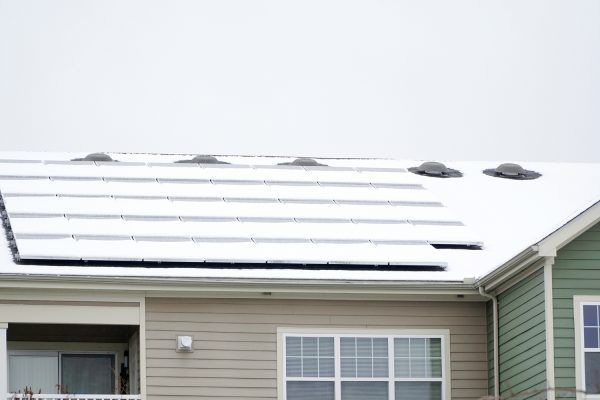
As an owner of a solar system or when considering going solar, it’s helpful to understand what your system will output over the course of the four seasons. Here in the northeastern United States, we do see significant variation in daily energy solar output from our systems over the course of a calendar year.
Solar Power Generation in Summer vs. Winter
Solar panels generally produce about 40-60% less energy during the months of December and January than they do during the months of July and August. This means that solar power generation is significantly less during the winter than it is during the summer.
Solar Panel Annual Energy Output
Based on real data from the Lightgauge monitoring systems we install for our customers, we can closely track each system’s energy solar output variation during the year. If we split the year into two equal parts at the Vernal and Autumnal Equinoxes (March 21st and September 21st) we can get a quantitative handle on this variation.
- On average, 65% of our local solar system’s annual energy output is generated between March 21st and September 21st of each year.
- The other half of the year, between September 21st and March 21st, accounts for the other 35% of annual solar output.
Furthermore, if we take a look at the two-month windows surrounding both the Summer and Winter Solstices (June 21st and December 21st) by comparing system solar outputs for June and July vs December and January we can further accentuate the seasonal variation.
Why Do Solar Panels Produce Less Energy During Winter?
The factors involved in this variation are threefold:
- Shorter days - Winter days are significantly shorter than Summer days. This means that the solar system will be running for less time each day and therefore produce less average energy per day.
- The angle of the sun - Compounding the effect of the shorter days is the fact that the sun angle changes dramatically in the winter as well. The sun, even at its peak around midday, is much lower in the sky during the winter months. For most residential rooftops this means that the sun’s rays will be hitting the solar panels less directly than during the summer months. This will cause the system’s power output to be lower which also has a direct impact on energy production.
- Atmospheric conditions - Not only do the winter months provide plenty of stormy weather and cloud cover, but the effect of snow cover on the panels after a storm is significant as well. With a thin covering of snow, the system will often still be able to turn on and output a small amount of energy. Larger snow accumulations on the panels, however, can keep the system from converting energy for up to a few days until the panels clear.
Does Lessened Solar Production in Winter Increase Energy Bills?
So how does this work with your utility billing? Won’t this cause system owners to get high electricity bills all winter long when their systems are under-producing and their usage is increased due to more time in the house, higher lighting loads, etc.? Not necessarily, and this is where net metering comes into play.
When we design solar systems for customers we always look at the total annual electricity usage when sizing the system. For customers with adequate roof space (or area for a ground mount) this allows us to design a system that overproduces enough during the spring, summer, and early fall to build up a bank of kilowatt-hours with the utility, which will carry the homeowner through the winter months, and the effects of reduced energy production during our northeastern winters can in fact be mitigated through correct system design, sizing, and net metering.
Do Solar Panels Work On Cloudy Days?
The assumption that solar systems can’t work when it’s cloudy is untrue. Solar panels do produce energy on days that are cloudier. However, the amount of energy produced on such days is at a lesser percentage than a clear day. Solar panels can usually generate around 10-25% of their standard energy production when it is cloudy. This percentage can also vary based on how cloudy the weather really is. That’s where net-metering can help. Similar to how net-metering can store energy for the winter months, it can also help provide you with the energy you need on cloudy days.
What We Advise
This is also why, for our customers who get their systems interconnected in months other than March and April, we advise them to utilize their utility’s “Anniversary Date Change” process to make sure that they are optimizing the use of their net-metered energy credits over the course of the year. If you’d like to learn more about optimizing your anniversary date please call Lighthouse Solar and speak with one of our Technical Sales Engineers.
Call Lighthouse Solar at (845) 251-2012 or contact us online to learn more about the seasonality of solar production!
